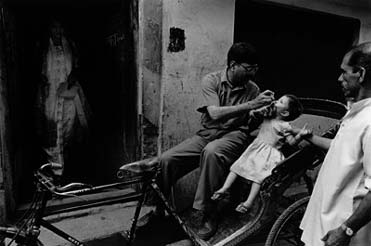

It was 1996, eight years into the polio eradication campaign. The virus still circulated intensely in much of Africa, paralysing thousands of children. Some countries, particularly those engulfed in war, had yet to organize a single mass immunization campaign. Routine vaccination rates were declining in many places. Leadership was needed. In response, Africa's most visible leader, South African President Nelson Mandela, stepped forward.
In August, Mr. Mandela launched 'Kick Polio Out of Africa', a campaign that has rallied the entire continent. By the end of 1996, 28 African countries had carried out National Immunization Days (NIDs),reaching more than 52 million children. Three years later, the Democratic Republic of Congo started mass immunizations – the last country in the world to do so.
The Initiative's history is marked by such leadership. Latin American countries helped show the way in the 1980s with mass immunizations. In 1993, China's President Jiang Zemin launched the first NIDs in the world's most populous country. Within two years, China had no new cases of indigenous polio. In 2001, the Presidents of the DR Congo, India, Mali, Nigeria, and Sierra Leone launched that year's rounds of NIDs in their countries.
Political commitment is essential for eradicating polio. In countries where polio is still endemic, political commitment helps ensure that the most vulnerable communities are reached; that often-scarce resources are dedicated to the eradication effort; and that regional and local governments implement countrywide coverage. In polio-free countries, commitment is needed to sustain high rates of routine immunization and rigorous surveillance for the disease. In wealthy donor countries, such commitment provides the Initiative with major funding and, often, technical expertise.
Political leadership has brought us to the brink of polio eradication. But if this leadership weakens now, the wild poliovirus will continue to circulate in a handful of endemic countries, defeating the goal of eradication. As long as one poliovirus remains, every country remains at risk.

© Sebastião Salgado
India
A health worker vaccinates a toddler against polio in the city of Moradabad during the May 2001 round of National Immunization Days.
 |